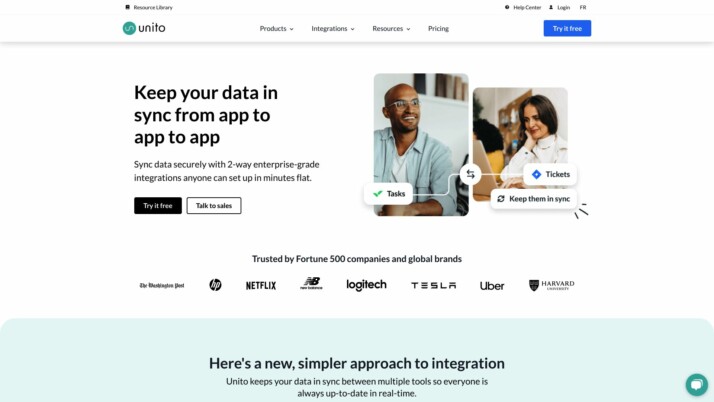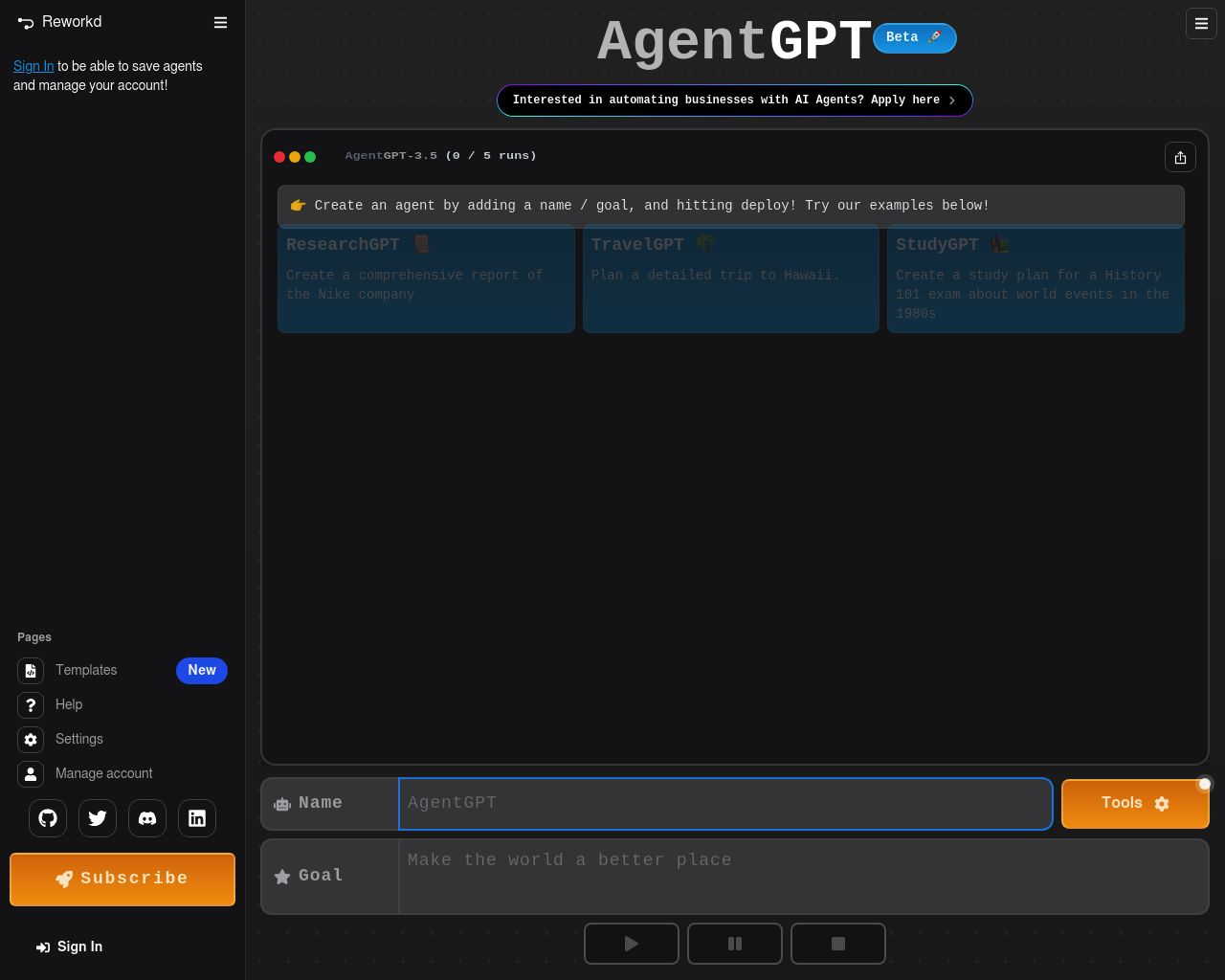Unito vs. AgentGPT: AI Workflow Solutions Compared
The AI landscape continues to evolve, offering powerful solutions for businesses seeking to streamline operations and enhance productivity. This comparison explores Unito vs. AgentGPT, and SmythOS—three distinct platforms addressing workflow automation and AI agent creation. Unito specializes in robust tool integrations, AgentGPT focuses on autonomous AI agents, while SmythOS combines these capabilities with advanced features. We’ll examine each platform’s strengths, limitations, and unique offerings to help you determine the best fit for your organization’s needs. Whether you’re a developer looking for API integrations, a business leader concerned with scalability, or a non-technical user seeking user-friendly solutions, this analysis provides valuable insights to guide your decision-making process.
Unito Overview
Unito offers a robust integration platform designed to streamline workflows across diverse tools and teams. The Unito Sync Platform enables real-time, two-way synchronization of data between popular business applications, eliminating information silos and enhancing collaboration.
Unito’s visual workflow designer empowers users to create custom integrations without coding expertise. This no-code approach allows teams to connect tools like Asana, Jira, Trello, and GitHub effortlessly. The platform’s deep field configuration options ensure precise data mapping, while its historical sync feature incorporates past data for comprehensive project insights.


Unito’s visual workflow designer empowers users to create custom integrations without coding expertise. This no-code approach allows teams to connect tools like Asana, Jira, Trello, and GitHub effortlessly.
Security stands out as a key strength, with Unito boasting SOC II Type 2 certification and enterprise-grade encryption. The platform also offers customizable rules, field mapping, and activity logs, providing users with granular control over their integrations and valuable insights into sync processes.
While Unito excels in connecting existing tools, it lacks some advanced features found in AI-focused platforms. The absence of AI agents, autonomous problem-solving capabilities, and multimodal interactions may limit its applicability in more complex AI-driven scenarios.
Unito positions itself as a solution for eliminating tool silos and fostering seamless collaboration. Its focus on user-friendly integration and robust sync capabilities makes it particularly appealing to businesses seeking to optimize their existing software ecosystem without diving into AI development.
AgentGPT Overview
AgentGPT empowers users to create and deploy customizable autonomous AI agents directly in a web environment. Unlike traditional chatbots, AgentGPT focuses on achieving broad, goal-oriented tasks. The platform stands out with its web-based interface, making it accessible to users without requiring local installation.


AgentGPT boasts features such as user authentication, agent run saving and sharing, dynamic translations, and AI model customization. Its web browsing capabilities expand the agents’ ability to access and process online information. The platform’s use of vector databases for memory management allows AI agents to retain execution history and access long-term memory, enhancing their functionality over extended periods.
AgentGPT boasts features such as user authentication, agent run saving and sharing, dynamic translations, and AI model customization. Its web browsing capabilities expand the agents’ ability to access and process online information.
Developers benefit from AgentGPT’s scalability and integration with tools like LangChain. The platform supports local runs through docker-compose without requiring an API key, making it accessible for testing and development. For production use, AgentGPT offers cloud solutions that seamlessly scale to meet demand.
While AgentGPT provides a robust set of features, it lacks some advanced capabilities found in other platforms. The absence of hosted agents for development and production environments, as well as limited options for environments, may pose challenges for users seeking a more comprehensive development ecosystem. Additionally, the platform does not offer autonomous agents or explainable AI features, which could limit its applicability in scenarios requiring high levels of transparency or independent operation.
AgentGPT’s vision centers on democratizing AI technology, making it accessible to individuals and businesses alike. The platform aims to streamline operations, boost efficiency, and enable informed decision-making across various industries. With its commitment to ethical AI practices and continuous evolution driven by community contributions, AgentGPT positions itself as a collaborative and inclusive tool in the AI development landscape.
Feature Comparison
Unito and AgentGPT offer distinct approaches to workflow automation and AI agent creation. Unito excels in connecting existing tools through robust integrations, while AgentGPT focuses on creating autonomous AI agents for task completion.
Unito’s strength lies in its visual workflow designer and no-code approach, allowing users to build complex integrations between popular business tools without programming knowledge. It provides deep field configuration options and historical sync capabilities, enabling precise data mapping across platforms. However, Unito lacks AI agent capabilities and autonomous problem-solving features.
AgentGPT, on the other hand, specializes in creating customizable AI agents that can perform goal-oriented tasks independently. It offers web-based deployment, user authentication, and the ability to save and share agent runs. AgentGPT’s use of vector databases for memory management enhances agent functionality over time. Unlike Unito, AgentGPT provides web browsing capabilities and supports AI model customization. However, it doesn’t offer the extensive tool integration ecosystem that Unito provides.
In terms of security, Unito boasts SOC II Type 2 certification and enterprise-grade encryption, while AgentGPT’s security features are less prominently highlighted. Both platforms lack some advanced features found in more comprehensive AI development environments, such as hosted agents for development and production, multi-agent collaboration, and advanced debugging tools.
Feature Comparison Table
| Unito | AgentGPT | SmythOS | |
|---|---|---|---|
| CORE FEATURES | |||
| Visual Builder | ✅ | ❌ | ✅ |
| No-Code Options | ✅ | ❌ | ✅ |
| Autonomous Agents | ❌ | ✅ | ✅ |
| Explainability & Transparency | ✅ | ❌ | ✅ |
| Multimodal | ❌ | ✅ | ✅ |
| Human-AI Interaction | ❌ | ❌ | ✅ |
| Agent Work Scheduler | ❌ | ✅ | ✅ |
| SECURITY | |||
| Constrained Alignment | ✅ | ❌ | ✅ |
| IP Control | ❌ | ❌ | ✅ |
| COMPONENTS | |||
| Foundation AIs | ❌ | ❌ | ✅ |
| Huggingface AIs | ❌ | ✅ | ✅ |
| Classifiers | ❌ | ✅ | ✅ |
| Logic | ✅ | ✅ | |
| Data Lakes | ❌ | ❌ | ✅ |
| DEPLOYMENT OPTIONS (EMBODIMENTS) | |||
| Deploy as Webhook | ❌ | ✅ | ✅ |
| Staging Domains | ❌ | ❌ | ✅ |
| Production Domains | ✅ | ❌ | ✅ |
| Deploy as Site Chat | ❌ | ✅ | ✅ |
| Deploy as Scheduled Agent | ❌ | ❌ | ✅ |
| Deploy as GPT | ❌ | ✅ | ✅ |
| DATA LAKE SUPPORT | |||
| Hosted Vector Database | ❌ | ✅ | ✅ |
| Sitemap Crawler | ❌ | ❌ | ✅ |
| YouTube Transcript Crawler | ❌ | ❌ | ✅ |
| URL Crawler | ❌ | ✅ | ✅ |
| PDF Support | ❌ | ✅ | ✅ |
| Word File Support | ❌ | ✅ | ✅ |
| TXT File Support | ❌ | ✅ | ✅ |
Best Alternative to Unito and AgentGPT
SmythOS stands out as the superior alternative to Unito and AgentGPT, offering a comprehensive platform for AI agent development and deployment. Our drag-and-drop interface simplifies the creation of complex AI workflows, making advanced AI functionalities accessible to users without extensive coding knowledge. Unlike Unito’s focus on tool integration or AgentGPT’s emphasis on autonomous agents, SmythOS combines the best of both worlds with a robust feature set and unlimited use cases.
SmythOS stands out as the superior alternative to Unito and AgentGPT, offering a comprehensive platform for AI agent development and deployment.
We provide a versatile ecosystem that supports integration with various AI models, APIs, and tools, surpassing the capabilities of both Unito and AgentGPT. Our platform enables the creation of multi-agent systems, allowing teams of AI agents to collaborate on complex tasks—a feature not available in Unito and more advanced than AgentGPT’s single-agent approach.
SmythOS excels in deployment flexibility, offering options to deploy agents as APIs, chatbots, or scheduled tasks across multiple environments. This versatility far exceeds Unito’s integration-focused approach and AgentGPT’s web-based deployment. Our platform also provides superior debugging and monitoring tools, ensuring transparency and explainability in AI operations—critical features lacking in both Unito and AgentGPT.
SmythOS excels in deployment flexibility, offering options to deploy agents as APIs, chatbots, or scheduled tasks across multiple environments.
Unlike our competitors, SmythOS offers a comprehensive data management solution, including support for various file types, web crawling capabilities, and a hosted vector database. This feature set enables more sophisticated data handling and processing, essential for developing truly intelligent and context-aware AI agents. With SmythOS, users can build and deploy AI solutions that are not only more capable but also more adaptable to diverse business needs and evolving technological landscapes.
In essence, SmythOS combines the strengths of Unito’s integration capabilities and AgentGPT’s focus on autonomous agents while offering a more comprehensive, flexible, and user-friendly platform for AI development and deployment. Our solution empowers users to create, manage, and scale AI agents with unparalleled ease and efficiency, making it the clear choice for businesses and developers looking to harness the full potential of AI technology.
Conclusion
Unito and AgentGPT offer distinct approaches to workflow automation and AI agent creation, each with its own strengths. Unito excels in connecting existing tools through robust integrations, while AgentGPT focuses on creating autonomous AI agents for task completion. However, SmythOS emerges as the superior choice, combining the best of both worlds and offering additional advanced features.
SmythOS outshines its competitors with a comprehensive suite of capabilities. Our platform provides hosted agents for both development and production environments, a visual builder for intuitive agent creation, and support for multimodal interactions. We offer advanced features like autonomous agents, explainable AI, and multi-agent collaboration, which are lacking in both Unito and AgentGPT.
Unlike Unito’s limited focus on tool integration or AgentGPT’s web-based deployment, SmythOS provides a versatile ’Create Once, Deploy Anywhere’ approach. This allows users to build AI agents that can be seamlessly integrated into multiple environments, from APIs and webhooks to site chats and scheduled tasks. Our platform also boasts superior scalability, a hosted vector database, and support for various file formats, making it a more complete solution for businesses of all sizes.
If you’re looking to harness the full potential of AI in your workflows, SmythOS is the clear choice. We invite you to explore our diverse range of AI-powered agent templates and experience the future of AI automation. Get started with SmythOS today and revolutionize your approach to AI integration and workflow optimization.
Last updated:
Disclaimer: The information presented in this article is for general informational purposes only and is provided as is. While we strive to keep the content up-to-date and accurate, we make no representations or warranties of any kind, express or implied, about the completeness, accuracy, reliability, suitability, or availability of the information contained in this article.
Any reliance you place on such information is strictly at your own risk. We reserve the right to make additions, deletions, or modifications to the contents of this article at any time without prior notice.
In no event will we be liable for any loss or damage including without limitation, indirect or consequential loss or damage, or any loss or damage whatsoever arising from loss of data, profits, or any other loss not specified herein arising out of, or in connection with, the use of this article.
Despite our best efforts, this article may contain oversights, errors, or omissions. If you notice any inaccuracies or have concerns about the content, please report them through our content feedback form. Your input helps us maintain the quality and reliability of our information.
